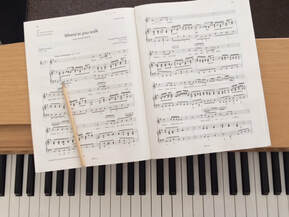They say that practice makes perfect, but is that really true? Not in my experience! Years of bad practice can really take its toll on your voice and body. When it comes to singing, you physically can't sing for hours per day without tiring and damaging your voice. It's important to have some strategy in place each time it comes to your own practice and also know when it's time to stop! Here are some of my top tips for a better practice:
1. What are you hoping to achieve? Being clear on your goals is a good place to start. Singing a piece through over and over again can be fun but it's not necessarily going to improve your singing. You might want to start by working on a few bars you are having difficulty with and refine those first. You might then decide to focus on your diction and getting every word as clear as possible or another technical aspect such as achieving a good ringing resonance on every note. The fact is you can't concentrate on everything at once so choose different aspects to work on and put them together layer upon layer. 2. Have a short warm up routine You want to feel alert and energised before you start to sing. Take a brisk walk or do some gentle stretching to wake up your body. Before you go straight into singing your music, do some gentle vocalising first. Gliding on a rolled 'r' or an 'ng' (as in the word sing) is a great way to warm up and lengthen your vocal folds before a performance or practice. Try to vocalise to the top of your range so you maintain length in the voice which stops it from getting bottom heavy. 3. Are you using yourself well? Your body is the vehicle for your voice and your whole self can be affected by any part of you. How you move, co-ordinate, breath, think and feel all has a direct impact on your voice. Taking some time to quieten your mind and body before practice calms the nervous system and gets you in a better mind set for singing. Firstly, check you are not holding your breath when not singing. Notice how your weight is distributed over your feet; are you standing more on one leg or leaning backwards? You might want to have a look in the mirror as it can be hard to feel exactly what you're doing. Try to keep your weight balanced over both feet which should be about hip width apart. Now ask yourself "how is my head balanced at this moment in time?" Is your neck dropped or is your head tilted backwards? Look out forwards and use your eyes to gently take in your peripheral vision. Now check in with your neck muscles and ask them to un-grip and free up a little. By thinking this, you may notice that your head will slightly alter it's own balance without you directly trying to do it. 4. Sing regularly for a shorter time It's good to push yourself sometimes and increase your stamina, but remember the important thing is the quality of your practice not the quantity. If you are fatigued and practice badly, you will only reinforce this type of singing and do yourself no favours. Sing a few phrases or sections through then take a break and sing it through in your head. Through Neuroscience we now know that when we imagine doing something, the body and mind respond in a similar way as if we were actually carrying out that action. 5. Know when to stop! When things are going well it's very tempting to keep singing but knowing when to stop is a skill you have to master. Singing is demanding on the voice, body and mind. Professional singers are vocal athletes and need to rest accordingly. It's quite rare in an opera or show to sing continuously for an hour without a break so why would you do this in your own practice. Sing for 20 minutes then take a break and let your mind and body assimilate all of that information. Stop if you experience pain and come back to your practice later. Pain could be a sign that you've over done it so listen to your body! 6. Record your practice Having an audio or video recording can be a great tool and asset for improving your singing. Once you get over the initial shock of hearing yourself, it can be fun and quite surprising to hear all the things you had no idea you were doing or not doing. With a small recording device you can trouble shoot out of tune notes, hear if you are out of time and notice poor and sloppy diction. I like to think of my i phone as my own personal vocal coach that I carry around with me. Bonus Tip! Have a lie down and try some semi supine practice to restore yourself. Practicing semi supine or active rest gives your back a rest, restores tired muscles, reorganises the body and mind and reboots your energy levels. To practice this click here and read my blog on semi-supine practice. If you've enjoyed reading this then please like or share the blog so similar people can benefit from these tips. If you are interested in booking a lesson or finding out more how I can help your singing then contact me here. See you again soon! © COPYRIGHT 2019 - useyourbodywell.co.uk. ALL RIGHTS RESERVED.
0 Comments
Leave a Reply. |
AuthorAdrian Ward - Alexander Technique Teacher, Voice Teacher and Singer. Archives
August 2020
Categories |

 RSS Feed
RSS Feed